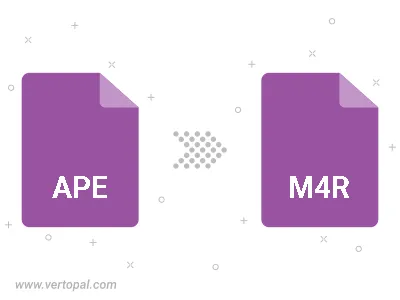Convert APE to M4R
Convert APE audios to M4R format, edit and optimize audios online and free.

The APE file extension, associated with Monkey's Audio, represents a lossless audio compression format designed to preserve original sound quality while reducing file size. Developed by Matthew T. Ashland in 2000, Monkey's Audio employs advanced algorithms to achieve efficient compression without data loss, making it a preferred choice for audiophiles and digital archiving. APE files support metadata tagging and are widely used in music production, storage, and distribution. While offering superior compression ratios compared to other lossless formats, they require specific software or plugins for playback due to limited native support across mainstream media players.
The M4R file extension stands for MPEG-4 Ringtone and is primarily used for creating custom ringtones for Apple devices, particularly iPhones. This format, a variant of the standard MPEG-4 Audio (M4A), emerged alongside the introduction of the iPhone in 2007. M4R files utilize Advanced Audio Coding (AAC) for compression, ensuring high-quality sound in a compact file size. Their use is strictly tied to Apple's ecosystem, allowing users to personalize their device's ringtones through the iTunes platform. M4R's history is closely linked to the evolution of mobile technology and the personalization trend in smartphone usage.
Select a APE audio from your computer, or drag & drop it on the page.
For advanced customized conversion, use APE to M4R tools and click Convert.
Let the file convert, then you can download your M4R file right afterward.

Trim & cut APE and convert it to M4R.
Convert APE to M4R and set the output channels to Mono (1.0) or Stereo (2.0).
To change APE format to M4R, upload your APE file to proceed to the preview page. Use any available tools if you want to edit and manipulate your APE file. Click on the convert button and wait for the convert to complete. Download the converted M4R file afterward.
Follow steps below if you have installed Vertopal CLI on your macOS system.
cd to APE file location or include path to your input file.Follow steps below if you have installed Vertopal CLI on your Windows system.
cd to APE file location or include path to your input file.Follow steps below if you have installed Vertopal CLI on your Linux system.
cd to APE file location or include path to your input file.